Lawyer Says Trial Of Mohammadi, Hamedi Not In Jurisdiction Of Revolutionary Court
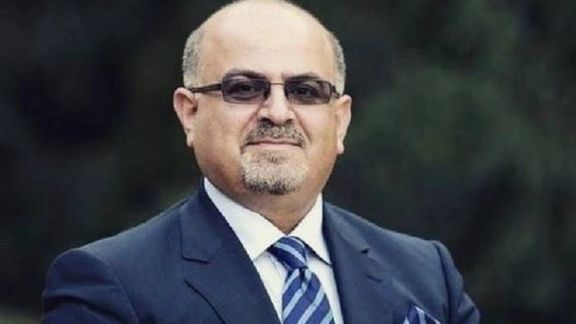
An Iranian lawyer says the Iranian Revolutionary Court is not qualified to investigate the charges of two imprisoned journalists who covered the death of Mahsa Amini.

An Iranian lawyer says the Iranian Revolutionary Court is not qualified to investigate the charges of two imprisoned journalists who covered the death of Mahsa Amini.
“According to the constitution, the branches of the Revolutionary Court do not have the jurisdiction to deal with political and journalistic cases,” said Arash Keikhosravi.
He said that according to law, Elahe Mohammadi and Niloufar Hamedi should have been released by now and their case should have been referred to one of the branches of the Criminal Court.
Their case has to be investigated in the presence of a jury in an open court, so that justice can be served, he added after the first hearing was held Monday in Tehran behind closed doors.
The two journalists have been charged with propaganda against the regime and conspiracy to commit acts against national security, which could bear death sentences.
Hamedi managed to visit Mahsa Amini in Tehran’s Kasra hospital and broke the news of her grave condition after being taken into the custody of the morality police three days earlier for wearing her hijab “improperly”. Amini was in a coma at the time.
Mohammadi, likewise, managed to travel to Amini’s hometown of Saqqez in western Iran to report on her funeral on September 17, which thousands attended.
The US State Department has called the "sham" trial a "mockery of justice" and shows the Islamic Republic's fear of journalists.
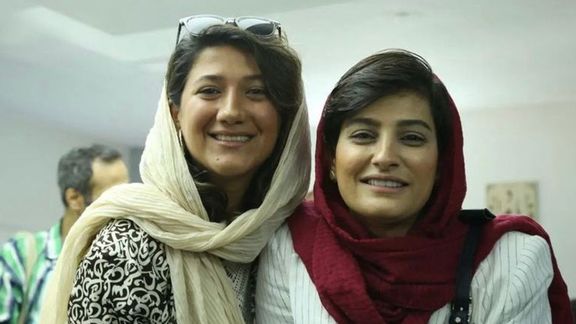
Reporters Without Borders (RSF) condemned the trials of Niloofar Hamedi and Elahe Mohammadi who first reported the death in custody of Mahsa Amini in September.
Calling the trials “sham” in a statement Tuesday, RSF said the two journalists who have been in detention since a few days after Amini’s death should be freed at once instead of facing possible death sentences.
The two journalists have been charged with propaganda against the regime and conspiracy to commit acts against national security, which could bear death sentences.
“The fact that Niloofar Hamedi and Elaheh Mohammadi were unable to see their lawyers, even a few days before their trials, confirms that this is travesty of justice whose sole aim is to legitimise the persecution of these two journalists. We demand their immediate release,” Jonathan Dagher, head of RSF’s Middle East desk, said.
In a tweet Tuesday, RSF also said banning the lawyers of the two journalists from speaking at their hearings was “further proof of the judicial farce against the two journalists.”
Hamedi, managed to visit Mahsa Amini in Tehran’s Kasra hospital and broke the news of her grave condition after being taken into the custody of the morality police three days earlier for wearing her hijab “improperly”. Amini was in a coma at the time.
Mohammadi, likewise, managed to travel to Amini’s hometown of Saqqez in western Iran to report on her funeral, September 17, which thousands attended.
The lawyers for Niloofar Hamedi, a reporter of the reformist Shargh daily, and Elahe Mohammadi, of the reformist Ham-Mihan newspaper, were banned from speaking at the 1st hearings.,” RSF tweeted Tuesday.
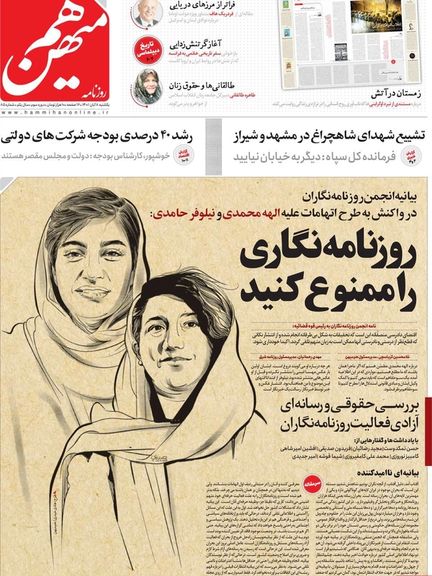
The first session of Mohammadi’s trial presided by the notorious judge Abolghasem Salavati was held behind closed doors at Branch 15 of the Revolutionary Court of Tehran on Monday. Hamedi’s hearing was held on Tuesday by the same judge and in the same manner. Lawyers of the two journalists were not allowed to speak.
Hamedi’s husband, Mohammad-Hossein Ajorlou who is a sports journalist himself, in a series of tweets Tuesday confirmed that Hamedi’s lawyer had not been given an opportunity to speak and said family members, including himself, were not allowed in the courtroom. According to Ajorlou’s tweet the date for the next hearing has not been set.
The Telegram channel of the ultrahardliner Raja News claimed that “anti-Iranian media” are trying to “reduce” the arrest of the two journalists to their coverage of Mahsa Amini’s death.
“But reliable information indicates that Niloofar Hamedi and Elaheh Mohammadi had participated in training courses of institutions that seek the overthrow [of the Islamic Republic] and had connections with foreign intelligence services,” Raja News which is affiliated to the ultraconservative Paydari Front wrote.
In October, Iran's intelligence ministry and SAS, the intelligence organization of the Revolutionary Guards (IRGC) accused Mohammadi and Hamedi of being CIA agents. “Using the cover of a journalist, she was one of the first people who arrived at the hospital and provoked the relatives of the deceased and published targeted news,” they said in a joint statement.
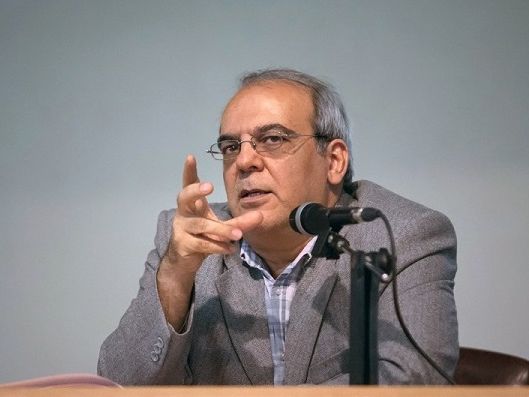
Abbas Abdi, a reform bloke politician said in a May 23 tweet that the government twists charges against dissidents to avoid open trials and demanded that the two journalists be tried publicly according to article 165 of the Iranian Constitution.
The Iranian Constitution stipulates that trials of political prisoners and journalists should be public and with the presence of a jury.
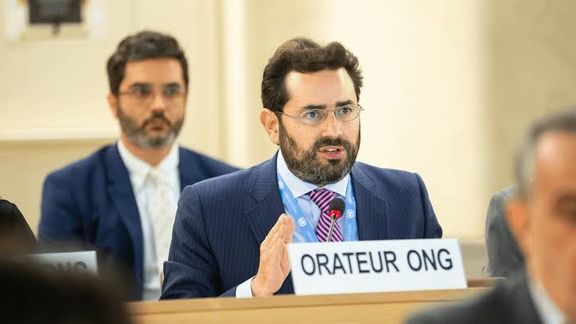
An independent human rights organization submitted a resolution to the UN to overturn Iran's appointment as the chair of the Social Forum of the UN Human Rights Council.
Hillel Neuer, international human rights lawyer and director of the UN Watch said in a tweet that the text was contained in a UN Watch submission to the 53rd Session of the UN Human Rights Council.
“There was no procedure to expel Iran from the UN Women’s Rights Commission, but we got that done,” said Hillel Neuer, referring to the group's recent campaign work which saw Iran thrown out of the UNWRC.
“We thank the more than 75,000 people worldwide who have signed our petition to stop Iran’s regime from heading the UN Human Rights Council Social Forum in November. Our goal is to reach 100,000 before approaching world leaders for their support,” said Neuer.
Since September the Islamic Republic has continuously undermined and increasingly suppressed the human rights of women and girls, including the right to freedom of expression and opinion, often with the use of excessive force and undercover surveillance.
Tens of thousands have been arrested arbitrarily, including women and girls.
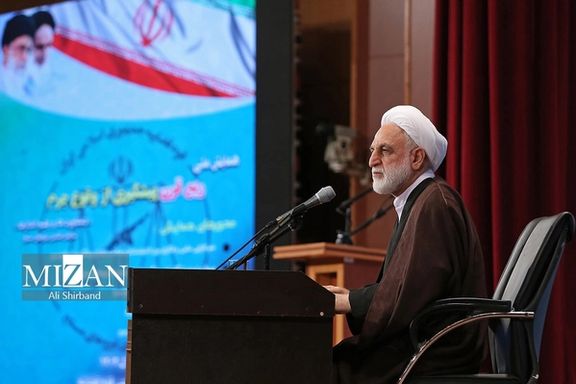
Amid global outrage over Iran's execution machine, the regime’s chief justice has defended the hanging of protesters, vowing to continue its killing spree.
Islamic Republic Judiciary Chief Gholamhossein Mohseni Ejei said Tuesday "The [death] sentences of those [protesters] who were/are supposed to be executed for their crimes during the riots have either been or will be carried out without any consideration while ensuring full observance of legal procedures, justice and fairness."
Emphasizing that the sentences will be implemented “without any delay,” he also defiantly called on security and intelligence agencies to arrest women who are flouting mandatory hijab rules and to hand them over to the judicial authorities for “severe punishment.”
Accusing protesters and those unveiling in public of being connected to “the enemies,” Ejei emphatically vowed: “Be sure that these elements will be severely punished.”
In the Islamic Republic's jargon "enemy" is used to refer primarily to the United States and Israel, and sometimes to their allies, and recently every entity and individual who has expressed support for the current wave of anti regime protests.
“The enemies are trying to create a divide in our society by psychological operations and bombarding the minds of young people and by taking advantage of some existing weaknesses,” the chief justice said, claiming these 'enemies' are trying to divide Iranian society.
Since the early weeks of the nationwide protests ignited by the death of 22-year-old Mahsa Amini by hijab or ‘morality’ police in September, the staunch regime mouthpiece has repeatedly ordered judges to issue tough sentences to protesters and those flouting regime diktat.
"I have instructed our judges to avoid showing unnecessary sympathy to main elements of these riots and issue tough sentences for them while separating the less guilty people," he said in October. In April, he warned of strict punishment for women flouting hijab rules.
Following the death of Amini for "improper hijab," a growing number of women have been ditching their veils in public, risking arrest by defying hijab laws in public places such as streets, malls, shops, banks, cafes, and even airports with videos and photos surfacing online everyday describing scenes with women casting off their headscarves as the new normal in Iran.
The Islamic Republic has intensified its killing trend in recent weeks, fueling further protests across the country. At least 259 Iranians have been executed since January alone, according to the United Nations.
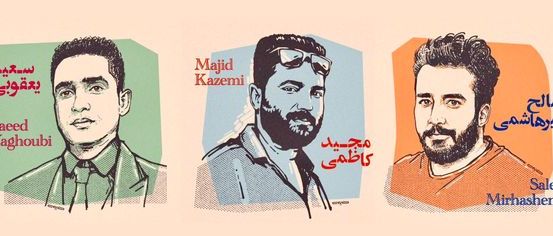
Amid a spike in executions since late April, on May 19, authorities arbitrarily executed three tortured protesters, Majid Kazemi, Saeed Yaghoubi and Saleh Mirhashemi who were unjustly convicted and sentenced to death in Isfahan (Esfahan).
The deaths brought to at least seven the number of protesters hanged since nationwide protests broke out in September 2022 following the death in custody of 22-year-old Mahsa Amini. The unrest posed the biggest internal challenge to the Islamic Republic since its establishment in 1979.
Earlier in March, Amnesty International said at least seven individuals in Iran face the death sentence in connection with protests, while dozens of others are at risk of being sentenced to death.
So far, around 750 civilians have been killed by security forces and at least 30,000 arrested. While many have been released, around 1,500 face criminal charges, and at least 80 detainees face the death sentence for the “moharebeh” and “corruption on earth”, Islamic-Arabic terms meaning to go against the will of God. Both carries the death penalty.
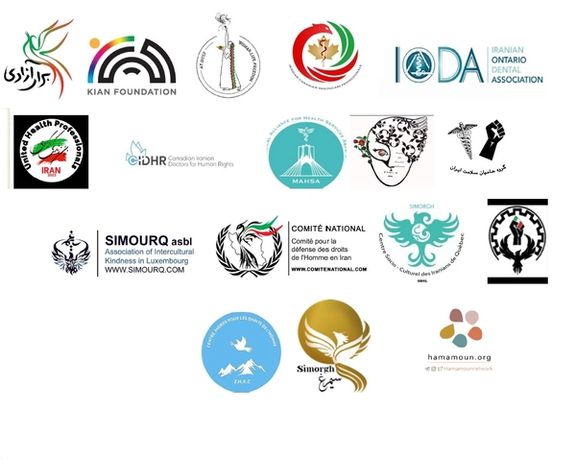
Twenty-six Iranian rights groups expressed fury over the appointment of the Islamic Republic as the chair of the UN Human Rights Council 2023 Social Forum.
A group of doctors, lawyers and civil activists such as the Kian Foundation and the Simourq Association are among the signatories to the letter to Vaclav Balek, the head of the UN Human Rights Council for 2023.
They defiantly condemned the appointment of Iran's UN ambassador Ali Bahraini as the forum’s chair after Vaclav Balek said in a statement earlier this month that he had decided to appoint Bahraini following the receipt of a nomination from regional coordinators.
The forum to be held in Geneva on November 2 and 3 will focus on the contribution of science, technology, and innovation to the promotion of human rights including in the context of post-pandemic recovery.
In their letter, the signatories stated that according to the UN Special Rapporteur on human rights in Iran, the violence of the security forces of the Islamic Republic during the nationwide protests led to the death of hundreds, including dozens of children and women, while hundreds of other protesters were seriously injured, and thousands were arrested.
Earlier, UN Watch launched a petition to the UN Secretary General Antonio Guterres to stop the Islamic Republic from chairing the forum and said there were still six months left to cancel the appointment.
The Islamic Republic was also voted out of the UN Commission on the Status of Women (CSW) in December for policies contrary to the rights of women and girls. It is in addition, also investigating rights abuses in Iran in a special committee, while simultaneously allowing the regime to chair a key rights event.
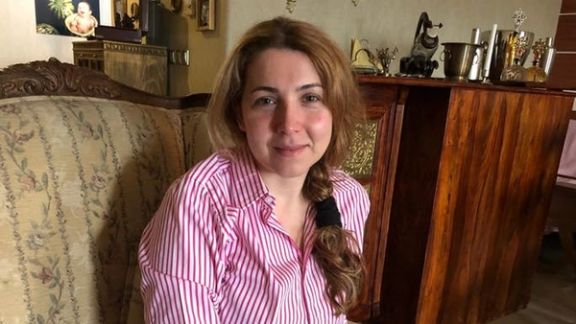
Several Iranian female political activists have spoken up about prison guards unnecessarily forcing them to strip naked, even in front of cameras, to humiliate them.
Anti-compulsory hijab activist, Mozhgan Keshavarz, who was the first to raise the humiliating stirp search of female detainees, told Iran International Monday via video conference that she was first strip-searched after her arrest in April 2019 and detention at Vozara Detention Center in Tehran where the 22-year-old Mahsa Amini died in custody on September 16 last year.
Keshavarz said the search took place in front of a camera and was repeated when she was taken to Qarchak Prison for women, and then at a Revolutionary Guards (IRGC) detention center where she was photographed completely naked and was told the photos were taken to add to her case file to make sure she would not later claim she was tortured during her detention.
At the IRGC detention center she was held in a solitary cell where she had to sleep on the carpet-covered ground and to shower and use the toilet in front of the camera in the cell.
“I had to wash my body with my clothes on,” she said, adding that she does not think the feelings of humiliation and shame she felt would ever go way. “I’m not the same Mozhgan that I was who always laughed.”
Keshavarz was assaulted by one of her interrogators there and her neck tendon was broken which required surgery. She was finally allowed to go on medical furlough in 2021 and was conditionally freed later. She is currently living in hiding as the IRGC has issued another arrest warrant for her.
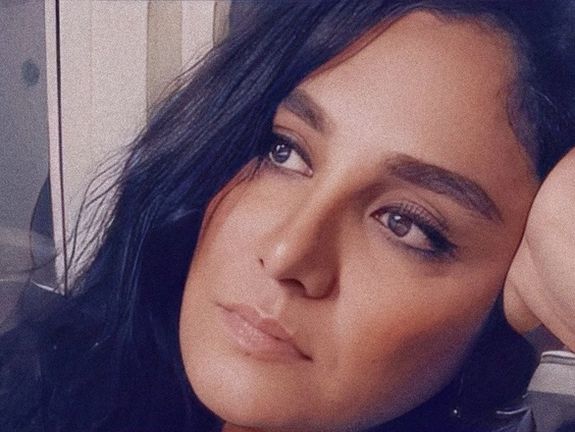
Keshavarz was arrested with two other activists for offering white roses to women on a Tehran metro train, the International Women’s Day, and asking them to support anti-compulsory hijab activists.
She was later sentenced by a revolutionary court to a total of twenty-three years and six months -- five years for “assembly and collusion for acting against national security”, one year for “propaganda against the regime”, ten-years for “encouraging moral corruption” and seven years and six months for “insulting sanctities”—but the sentence was later reduced to twelve years and seven months after appeal.
Keshavarz’s story was first shared with the public through the Twitter account of the Me-too-Movement-Iran on Saturday. She told Iran International that she only wanted to share her feelings with others but soon found out that what happened to her is a routine practice in prisons and many other activists have had the same experience.
Since her revelations, other female activists including Zeynab Zaman, Shaparak Shajarizadeh and actress Mahnaz Afshar who were subjected to same humiliation have also come forward with their stories.
In a series of tweets Sunday, former political prisoner Nasibeh Shamsaei said she was forced to fully strip in front of prison cameras at a ward run by the Revolutionary Guards (IRGC) at Evin Prison of Tehran and again at Qarchak Prison for women.
“I was forced to do this three times. I was told to strip in a cell measuring two by one and a half meters at A2 Ward of the IRGC at Evin Prison with a camera above my head and I didn’t know who was watching… She made me squat and get up twice under the pretext that she wanted to make sure I hadn’t hidden anything in my vagina. The same thing happened when I arrived at Qarchak and once again after an in-person visit,” she wrote.
According to Shamsaei women were forced into such humiliating search even if they were having their periods. “After the in-person visit she forced me into it when I was having my period.”